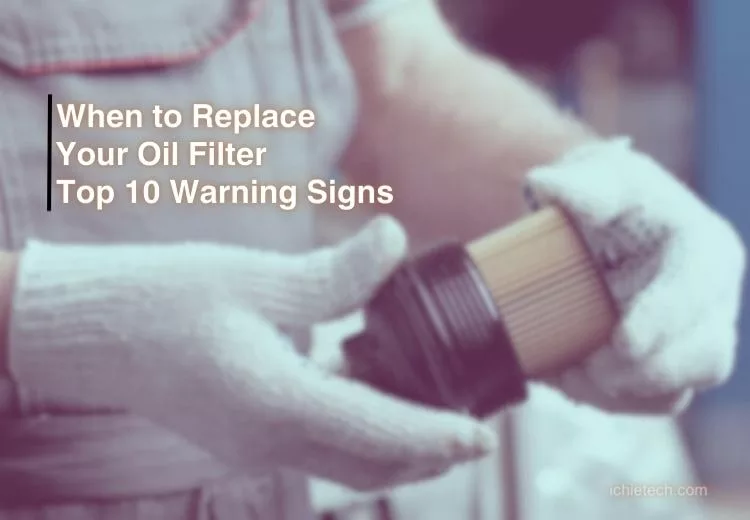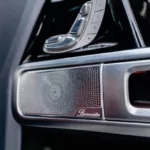Picture this: your car is your trusty steed, and the oil filter is its loyal guardian. Neglecting this small yet essential component could expose your vehicle to a host of engine problems, ultimately jeopardizing its lifespan. In this article on IchieTech, we’ll embark on a journey through the top 10 warning signs that your oil filter is sending you an urgent message – it’s time for a replacement.
10 Clear Signs Your Oil Filter Requires Replacement
-
Reduced Oil Pressure
Oil pressure is the vital force that ensures your engine’s moving parts stay lubricated and friction-free. When the pressure drops below the recommended level, it’s like a heartbeat slowing down. It’s a sign that something isn’t right. Low oil pressure can be caused by various factors, but one of the main culprits is a clogged oil filter. This section will dig deeper into the causes of low oil pressure and why it’s a significant indicator that your oil filter might be crying out for a replacement.
-
Dirty or Dark Oil
Think of engine oil as your car’s lifeblood, carrying away contaminants and ensuring smooth operation. But what if this lifeblood darkens and becomes contaminated itself? Your oil filter is responsible for sieving out these impurities, ensuring your engine runs like a well-oiled machine. However, over time, the filter can become saturated, allowing contaminants to pass through. As a result, your engine’s oil turns dirty or dark. This section will unravel the vital role of the oil filter and how the quality of your engine oil can be a telltale sign that your filter needs attention.
-
Engine Noises
Engines often communicate with their owners through sounds, and they can tell quite a story. Yet, not all engine sounds are comforting. Unusual clanks, knocks, or rattles can be a distress signal from your oil filter. These noises may signify that it’s struggling to allow oil to flow freely. In this section, we’ll explore these sounds and discuss how they might be linked to filter issues.
-
Poor Fuel Efficiency
We all keep an eye on our fuel efficiency, but did you know that a clogged oil filter might be sapping your precious miles per gallon? When the filter becomes clogged, the engine has to work harder to push oil through it, resulting in higher fuel consumption. This part examines how a compromised filter can affect fuel efficiency and the intricate correlation between the two.
-
Slow or Rough Idling
Your car’s idling should be as smooth as a serene lake, but when it’s rough or sluggish, there’s something amiss. Idling problems are often related to engine performance, and your oil filter plays a role in this scenario. As it becomes clogged, it restricts the flow of oil, affecting engine components that rely on this lubrication for smooth operation. We’ll explore the connection between idling and engine health, shedding light on how filter-related issues can disrupt this calm.
-
Check Engine Light
Modern cars are equipped with sophisticated systems that monitor various components, including the oil filter. When the check engine light comes on, it’s a clear message to pay attention. This section elaborates on how the check engine light can help diagnose filter issues, ensuring you can address them promptly and avoid more significant problems down the road.
-
Overheating Engine
Engines generate a significant amount of heat, and it’s the oil’s vital role to keep them cool. When the oil flow is obstructed due to a clogged filter, the engine faces the risk of overheating. This can lead to severe damage if left unattended. In this section, we discuss the intricate relationship between heat and engine function, along with how a blocked filter can lead to overheating.
-
Oil Leaks
Oil leaks are like your car’s cry for help. Identifying them and understanding their causes are crucial for maintaining your vehicle’s health. This section will delve into the art of spotting oil leaks, explaining their various causes and their direct relevance to your oil filter.
-
Reduced Acceleration
The need for speed is universal, but reduced acceleration can be a frustrating hurdle for any driver. In this part, we explore the connection between acceleration and the smooth flow of oil. Discover how a clogged filter can be a roadblock to your car’s speed, emphasizing the importance of a timely filter replacement to restore your vehicle’s performance.
Final Thought
Let’s not forget the consequences of overlooking these signals. An overheating engine, oil leaks, and reduced acceleration can be the costly aftermath of filter neglect. To avoid these pitfalls, it’s crucial to act on these warning signs promptly, replacing your oil filter when needed.
Replacing your oil filter isn’t just about taking care of your engine; it’s a testament to your commitment to your car’s well-being. So, the next time your car murmurs its concerns through these signs, listen closely and show it the care it deserves. By replacing the filter when these warning signs appear, you’ll not only extend your vehicle’s lifespan but also ensure that it continues to purr like a well-tuned symphony on the open road.
Don’t miss out on the latest updates! Follow us on Instagram, X (formally Twitter), Pinterest, and Facebook for daily tech and auto content and insights.










